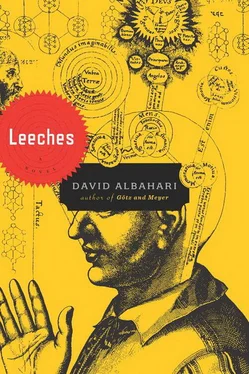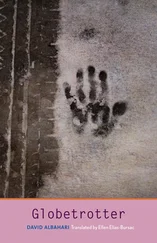Politika and one word cut out of
Danas. A day or two after the piece was published, graffiti appeared on a building near the editorial office of
Minut, which said, JEWS ARE NOTHING BUT NUMBERS, and under it the next night someone added, AUSCHWITZ COMMANDER, and out in front of my door I was greeted by foul-smelling excrement again, wrapped in a photograph of the Dead Sea, but, I confess, I didn't understand what that meant. I had never been good at interpreting symbols, and for the life of me I couldn't divine whether the excrement was an allusion to death, as suggested by the name of the sea, or to a surfeit of salt, a spooky atmosphere, a depression on the earth's surface, which could possibly be associated with hell, or whether the purveyor of the excrement, perhaps better the producer of the excrement, had no other picture of Israel handy, so the picture he did have, a somber view of the empire of salt, had to suffice for the wrapping. In any case, the shit lay over the photograph as if it were floating on the surface of the sea. The excrement, the writing, the irate messages warned me that there were worse things to come, and indeed, in the next few days I noticed those young men trailing me more often, and I tried to avoid coming home late at night or taking solitary walks along the river. At night I heard sounds in the hallway of my building, as well as in front of my door, which prompted me to position things useful for self-defense around the apartment: an umbrella, a board from the cellar, a hard plastic pipe, a hammer, and a wrench. And as I was placing them strategically, I had to laugh, because I knew I'd never use them, or if I were to use them, I'd be more likely to hurt myself. The hammer fell on my foot more than once. However, when the phone rang the next night, I grabbed the rolling pin from under the bed and started for the door. I stood there in the dark for a while, listening to the silence in the hallway, and only then did I recognize the sound of the phone ringing behind me. I walked over to the phone, rolling pin raised, as if, when I picked up the receiver, someone might leap out, but when I put the receiver to my ear, I heard Margareta's voice. Chagrined, I hid the rolling pin behind my back. She apologized for calling so late, especially if she'd woken me, she said, but she'd just read my piece in
Minut and had to call me that instant. She enunciated words by separating them into syllables and spoke as if she were humming. That's all right, I said, wondering what to do about the rolling pin. Why did I own a rolling pin in the first place, a rolling pin that looked old and battered, though I never bake, and the making of pastry dough, which is what, as far as I know, the rolling pin is generally used for, I consider to be an undertaking more challenging than the efforts of an alchemist at making gold? Margareta, however, was interested in the Sephirot, as far as numbers were concerned, she said, she knew nothing, and even an ordinary visit to a market was torment because of the awkwardness she felt when the woman at the cash register handed her back the change. Some things, I thought, we will never know, and while Margareta was talking about her wanderings through the deserts and the primeval jungles of numbers, I was putting the rolling pin back under the bed. But, Margareta then said, back to the Sephirot. Did she think, I asked, that I should have said there were in fact eleven, and should I have mentioned the hidden one, Knowledge, situated between Wisdom and Understanding? Hey, said Margareta, about such topics we are better off talking without an intermediary. It so happened she was in the apartment in the high-rise by the Danube where Marko and I had found her message, and she would like us to go on talking about the Sephirot there if I didn't mind getting dressed, of course, and going out so late at night. How did she know, I asked, that I wasn't dressed? I know all sorts of things, said Margareta, but I don't let on. I said nothing. I wondered whether she knew about the brandishing of the rolling pin. I would not be surprised. Fine, I said, and started pulling clothes on even before I'd hung up. All the while, even once I'd gone out into the street, I could not get the rolling pin off my mind, though what worried me more was completely forgetting something. I've always been fascinated, I later said to Margareta, by the mechanism of forgetting, or rather the question of how to check whether something is forgotten or not, because if it has been forgotten, I said, it is no longer in question, which means, if it is still in question, then the oblivion is not complete. Just as it wasn't complete in the case of my rolling pin, I said, if, indeed, it was mine at all. Margareta laughed with a full-throated laugh that I didn't entirely appreciate at that time of night, maybe because her teeth flashed sharply in the gloom of the apartment in the high-rise. I didn't mention that when I entered the high-rise and found that the bulb in the stairwell was out, I regretted not bringing the rolling pin, especially when it seemed that someone was breathing in the dark not too far from me. I didn't dare use the stairs, I would have been quaking at every corner, so instead I called the elevator and took it to the fourth floor. Margareta opened the door before I had had the chance to ring the doorbell or use the key from the mailbox. She was barefoot, and, trying not to look at her feet or at my pale image in the oval mirror, I started talking about the rolling pin while we were still in the front hall. Numerous lamps were on, so that, dappled with shadows, the apartment seemed buried in books. More books on the floor than before: some piled high had toppled, so in places it was barely possible to wade through. A lamp was also burning on the small desk, casting light on a volume of an encyclopedia, next to which there were pages of writing. Margareta offered me tea, and when I accepted, she went into the kitchen to put on the kettle. I went to the window, looked to the left, looked to the right, night was everywhere. The lights of the capital city were squinting as if ready to go to bed. I turned when I heard clinking; Margareta set the tray on the floor, then sat beside it. Her skirt momentarily slid up her thigh, baring a dazzling whiteness, which forced me to look up and study the expanse of ceiling. Jasmine tea, said Margareta, and passed me a cup. She'd tried any number of teas, she said, but jasmine she liked best, and in any case, she added, there is nothing better for a conversation about good and evil. If she was thinking of my rolling pin, I said, that would be the embodiment of good, and it would only have something to do with evil if it were to land on a bad skull. There is nothing absolutely good or absolutely bad, answered Margareta, even in a rolling pin, though she believed, she added, that there were rolling pins that had pressed evil to the very edge of their cylindrical form. I laughed. I could not believe, I said, that she had got me up at three o'clock in the morning so we could talk about good and evil rolling pins. That is because, Margareta said, I thought I'd left my rolling pin at home, but I still had it with me. Many people, she felt, do not understand that things rule us only because we are careless with them. When you leave something, she said, then it must be left behind within the self and outside the self. She stretched out her hand, plucked a book from the nearest pile, lifted it, then set it on the floor. I am leaving it here, she said, but I am also leaving it in myself. She touched her stomach, as if she'd swallowed the book. If she were to walk away now, she said, and stood up abruptly, the book would remain, both outside and inside, and when she returned, she said, and sat back down, she would pick it up as if she'd never left it, in the room or in herself. As she was sitting, the whiteness of her thigh shone again. Margareta sipped her tea. Next time, I said, I will be more careful. No, said Margareta, it has nothing to do with being careful, and there may be no next time. She looked hard at me, and I had to make a major effort to sustain her gaze, not knowing what was expected of me. She had gray-blue eyes, more gray than blue, now that I think of it, though after all these years I'm not sure of that either. All right, she said, now listen. I'm guessing she talked for more than an hour; then she went off to brew fresh tea. What did she talk about? About the Kabbalah, the system of the Sephirot, the emanation of divine substance, about the system of everything in existence, the notion of good and evil, the migration of souls, the harmony of the spheres, the influence of the planets, prayer and silence. Some of the things were familiar, while others I was hearing for the first time. I got up, lifted my arms, stretched, then began pacing back and forth by the bookladen shelves. I passed by the desk, eyed the pages of writing, but didn't dare stop and study them more closely, though the sounds coming from the kitchen confirmed that Margareta was still busy preparing the tea. I did, however, recognize the open book; it was the volume of the
Читать дальше







![David Jagusson - Fesselspiele mit Meister David [Hardcore BDSM]](/books/486693/david-jagusson-fesselspiele-mit-meister-david-har-thumb.webp)




